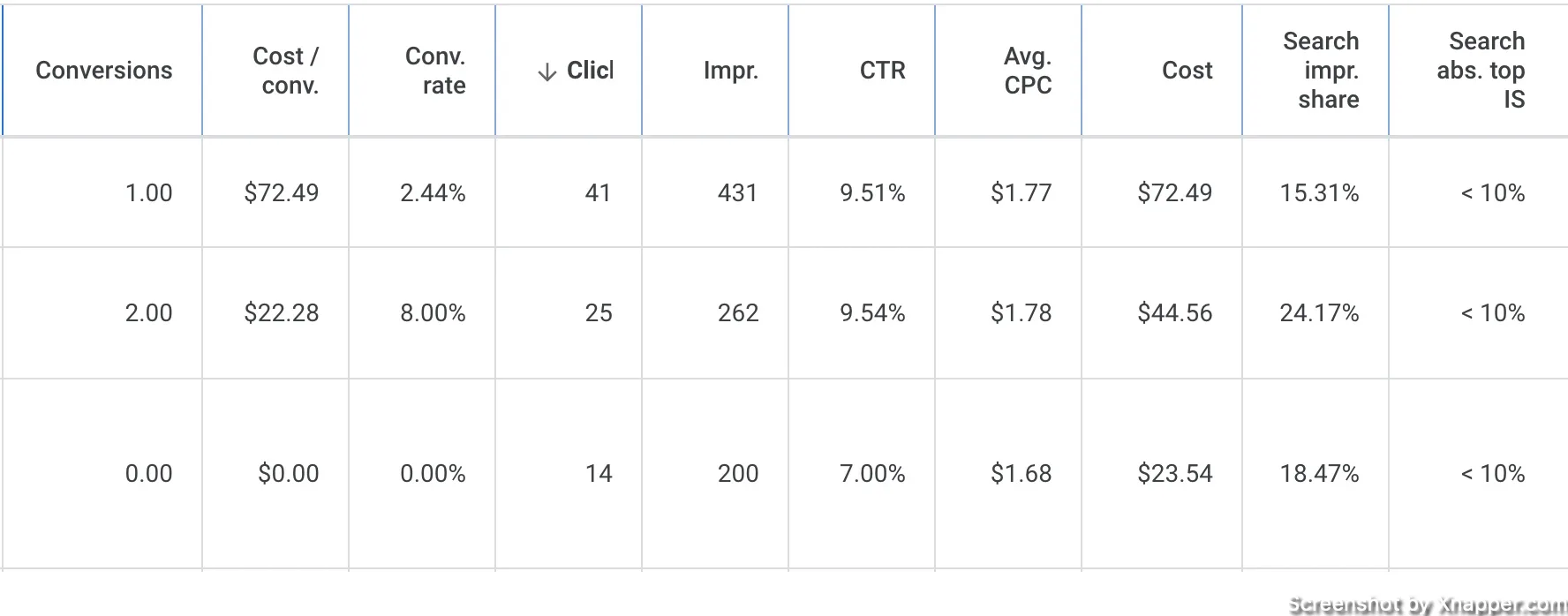
When creating Search campaigns, many Google Ads experts praise machine learning, and you might often hear them saying, “Start with broad match keywords and an automated bidding strategy”. They claim that CPA bidding and broad match keywords are all you need to reach your campaign goals successfully.
In theory, a broad match is “smart”; well, at least, it uses more signals than a phrase or an exact match. This is straight from Google:

But if a broad match is so awesome, do we need other match types at all? Let’s see how performance differs by match type for some advertisers. This will help you answer the question of whether you should use other match types besides broad match and when to do it.
Match types
I know most of you reading know this, but there might be a few that don’t. So please bear with me. Or you can skip this part altogether.
A while back, Google mostly used syntax matching, which means it matched specific words in users’ search queries.
With new technology, especially AI, Google started to better understand how people search, and they added an additional layer of semantic matching, basically looking at what those searches mean. This gives Google a broader understanding of each search, and that means that the keyword you bid on can match a broader spectrum of searches.
There used to be more stricter differences between match types, but now it’s more like a scale. It’s not black and white anymore.
Broad match
As the name indicates, this is the broadest match. This means that Google will treat your keyword in the broadest way possible. Look at this keyword below. If you just leave the “gym” keyword in your ad group, it might match all of these users’ searches. Because it’s a broad match, in Google’s eyes, it can be everything related to the gym. You will be attracting a wider audience.

This could be a problem because you usually don’t want your ad to match such a broad spectrum of keywords. You might not have anything to offer to people who click on your ad after searching those keywords.
So you get a wider audience and more exposure, but at the same time, more irrelevant searches.
Phrase match
This type only matches your specified phrase in the users’ search. This match type is marked by using quotes like this “keyword,” as seen in the table below. It is a more restrictive match type compared to the previous.

I say that your ads will not be shown with the searches in the right column. This might not be true. Phrase match is not what it used to be. Google will match more searches because of that semantic layer. But in this case, it will not be that broad.
You’re more in control with phrase match compared to broad match.
Exact match
The last type, which, as you guessed, is the most precise, hence the name. It is expressed in brackets [keyword].
This is where you want your ad to be shown only when users search for precisely (almost) what you have specified in your keywords. These keywords leave little room for Google interpretation, so they get less traffic. However, due to how Google works, even exact match keywords can match search queries with a slight degree of variation.

Impression share metric
It’s a great metric to understand how many impressions you are getting from the total amount you could get. Sort of like your market share. If it shows 100% (which is very rare) that means your ad is shown for all the searches that are related to your keywords in that campaign or ad group. It is based on your budget, bid, devices, country, and other factors.
Each keyword you have in the account has a certain amount of impressions. There is a limited number of people searching on Google for each keyword. You can’t impact that, you can’t force more people to search for particular keywords. The only thing you can do is to increase your impression share.
Look at this campaign, which is fairly new (it’s not all keywords, but the metrics are similar):

The advertiser wants to increase impression share, seeing that keywords have started to convert, but they only have, on average, around 15% of impression share. And if you look at the absolute top impression share, it’s even lower. However, since they are on CPA bidding with broad match keywords, the only way to get more exposure is to increase the target CPA bid or their Quality Score.
Most of their keywords have a quality score of 8 out of 10. So there is not a lot they can do. At least nothing to get results quickly.
Increasing the target CPA bid caused the actual CPA to increase. Even more than the target bid. They also got more conversions which is great, but their impression share remain similar.

After looking at search terms and doing a little bit of digging they found out that exact match keywords have higher impression share. Like these few keywords:

They combed their account for their top-performing keywords and added a bunch of exact keywords to their campaign along with some phrase matches. After the change, their impression share increased by 23% and absolute top impression share by a whopping 37%.
Their ads for their top keywords were showing more often and in a higher position.
With broad match type, you don’t have the most accurate understanding of your impression share. Impression share is calculated every time a keyword in your ad group is eligible for the auction. Having the exact match keywords gives you the most accurate picture of how often you can show for your top search terms.
Looking at a larger account we see that impression share is higher with phrase match keywords present.

They don’t have a lot of exact match keywords as you can see. They balance between broad and phase matches. However, the impression share is higher by 15% with phrase match keywords.
Impression share is not the goal. It’s conversions. However, having a lot of broad match keywords might not get you the most conversions from your top-performing keywords. Your goal is to make sure that if someone searches for your top keywords, your ads are always shown, and the higher, the better.
Do you have an unlimited budget?
If you do, awesome. Most of us don’t. When you use smart bidding in combination with broad match keywords, you might get a lot of traffic. Depending on your keywords, of course. But as we know, with a broad match, a lot of this is left to Google to decide.
What if your daily budget is capped at a certain amount? You can’t afford to waste money to catch all negative keywords or wait until you accumulate a significant amount of impressions or clicks.
The question is, do you still start with broad match keywords?
In this account, you see that phrase match is the winner when it comes to ROAS (return on ad spend).

The broad match is close but lower. It might be due to the fact that Google matches more various keywords, and some of them are not ready to convert. From what I’ve seen, some keywords in the Search report might have little to do with the business advertised.
So with a limited budget you want to control the traffic. You don’t want just random search queries. You want to narrow it down a bit to get a better ROAS.
If your budget is limited, like most advertisers, starting with an exact or phrase match is your best option. Once you see that you have an extra unspent budget, you can expand your keywords to a broad match and see what kind of return you are getting.
Bidding strategy
With automated bidding strategies, the most common are CPA bidding with or without a target CPA and ROAS with the target or without. The difference is very simple. If you don’t specify a target, then Google will try to get the most conversions or revenue (value) out of your budget, regardless of how much one conversion costs.
Usually, with max bidding, Google finds a way to spend your budget if you see broad match keywords. Hence, your CPA might be higher. There are so many variations of broad match keywords, not everyone is a possible conversion. Their search intent is lower.

As you can see here, manual CPC has a lower CPA and fewer conversions. With automated bidding and broad match keywords, you get more conversions, but those are 15-20% more expensive, at least in this account. It’s hard to say what would be if all campaigns were on manual CPC; would it gain a similar amount of conversions or not?
But at the end of the day, what matters are your goals. If, for example, my budget is reduced, I would need to lower my CPA so that my total number of conversions would not drop so much. I would probably switch to manual CPC, as this gives me more control. You can try to reduce CPA with automated bid strategies, but it’s harder to control it, along with conversion volume.
There are many ways you go about optimizing your campaigns. Don’t let anyone tell you there is only one way.
What can you take from this?
So, what have we learned after reviewing some of the examples above:
- If you have a limited budget, you should be using exact or phrase-match keywords. You will get better results.
- If you want to see a more accurate impression share report, you have to add exact keywords, at least your top-performing ones.
- I would not recommend using broad match keywords without an automated bid strategy (tCPA or ROAS). Without Google knowing what keywords convert, it’s very easy to spend your budget on useless clicks.
- Depending on your budget, you can scale up or down with broad match keywords. If your budget increases, you can use more broad keywords to capture additional conversions. If the budget decreases, you can pause the worst-performing broad keywords. You can also control performance with exact terms and negative keywords.
- No match type is the best. You don’t have to pick one. If someone tells you that one match type is way better, take it with a grain of salt. It depends on a lot of factors. Match types are to help you control the traffic. A combination of match types get’s you insights and help steer machine learning the right way.
FAQ
Do I have to start with broad match keywords?
No. In fact, I would not recommend it unless you have a large budget and a lot of conversions. A lot of people advise starting with a broad match to get more relevant searches, but that is at your expense. You know your relevant searches if you do your keyword research.
What is a default match type in Google Ads?
Broad match. If you’re starting your campaign, Google will suggest starting with smart bidding and broad match.
What are broad match modifiers?
It’s a discontinued match type, sort of. You could add “+” near each broad match keyword to tell Google what words in that phrase are important to you. However, this became obsolete due to changes in how Google matches keywords.
Can all my keywords be an exact match?
Yes. With a limited budget, it is actually recommended. You have better control over search volume.
Can I have the same keywords in different ad groups or campaigns?
No. This is not recommended, as you won’t see an accurate picture of keyword performance.
Can I have just one keyword in my campaign?
Yes. You will be limiting the traffic, but if you’re sure that this keyword is the best for you and you don’t want to spend on any other keywords, go ahead.